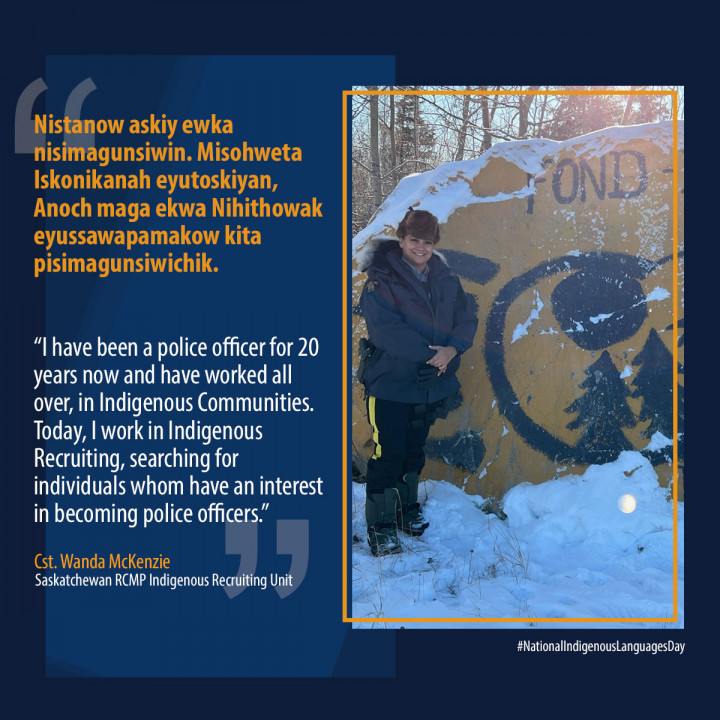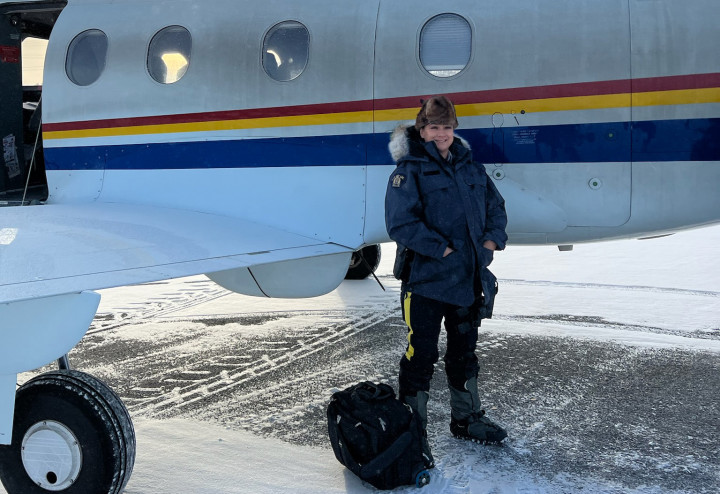"Not many people speak Cree or Dene, or other Indigenous languages. The opportunities it has given me in my career have been so unbelievable that I can't even begin to share them all with you. We need more of this in the RCMP so we can be a better team. Take the time to learn the language and use the languages, as they will take you places and can help you out in our communities," shared Cst. McKenzie, a #RCMPSKIndigenousRecruiter who is fluent in the Cree language, to a group of recent Indigenous RCMP applicants.
March 31st marks #NationalIndigenousLanguagesDay. Cst. McKenzie recognizes the importance of using her native language and uses it regularly as a way to stay connected to her culture and folks in our province, whether it be at a local powwow, at recruiting events, over a cup of tea, or even in an interview about her career. Just a few months ago, Cst. McKenzie was interviewed by MBC Radio in the Cree language, where she was able to share a little bit about herself and her decision to become an RCMP officer. Here is what she had to share in that interview:
"I grew up in a small northern town called Brabant Lake, SK. At that time, there were around 120 people living there, and one store that carried basic grocery items. Growing up, I was surrounded by beautiful land and forests, bodies of water, rivers and medicines, where my family and I would haul water by hand and gather wood daily for our home. Including my own family, many people in the area lived a traditional lifestyle of hunting, fishing and trapping, and continue to do so. I was raised with traditional teachings and still follow them to this day. The North gives me peace and I am forever thankful for my upbringing.
As a child, I had positive experiences with the RCMP, and remember local RCMP officers would often stop to visit my mother over a cup of coffee or tea. I even remember having a playful foot race with an officer… who ultimately let me win! The thought of solving pieces of puzzles (investigations) intrigued me and the fact that I felt safe every time they arrived gave me comfort.
As a 5-year-old child, I recall sitting on my mother's lap and asking if there were any female officers, to which she told me there were, but not many. I asked her if I could be one when I grew up. She reassured me I could and that she would support me to do so.
As I matured, I toggled between the decision of a career as a Conservation Officer due to my love of the land, or of an RCMP officer as I wanted to make a difference in my own child's life as well as others'. I was able to participate in a Summer Student Program with the RCMP in Grandmother's Bay, Stanley Mission, and La Ronge and loved the experience, which would ultimately end up playing a significant role in my decision several years later to become an RCMP officer. I went on to apply and began my journey with the RCMP.
Nistanow askiy ewka nisimagunsiwin. Misohweta Iskonikanah eyutoskiyan, Anoch maga ekwa Nihithowak eyussawapamakow kita pisimagunsiwichik.
I have been a police officer for 20 years now and have worked all over, in Indigenous Communities. Today, I work in Indigenous Recruiting, searching for individuals whom have an interest in becoming police officers.
Ewichihiyahkwaw kita saguskinihtahchik massinahigunah, kahpi eyiyumihiyahkwaw, kita kisitahchik eyowiss kikway kitah nitahwi ayumischikichik simagunsinah.
We help them with the application process and maintain continuous communication, so that they can be successful in entering the Police Training Academy."
If you see Cst. McKenzie in your community, don't hesitate to say hello (How are you?) or Tansi (pronounced tahn-sih), because as Cst. McKenzie sees it, "It is an absolute bonus to learn and speak an Indigenous language!"



